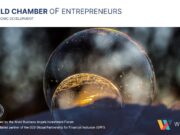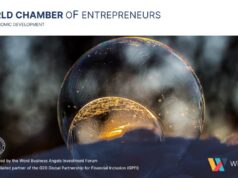Baybars Altuntas was a guest editor of the World Class Startup magazine’s special edition for the Global Fundraising Stage of the World Congress of Angel Investors, WBAF 2022. Angel Investor Review now shares his article with its subscribers online.
Baybars Altuntas is Executive Chairman of the World Business Angels Investment Forum, an affiliated partner of the G20 Global Partnership for Financial Inclusion (GPFI), and Global Chair of the World Business Angel Investors Week.
While the world strives to contain the pandemic, entrepreneurs, startups, and SMEs do whatever they can to maintain continuity and ensure survival. In the long term, however, such responses will not be enough. Companies need to grow and thrive in the post-pandemic world, so we must move swiftly to create pandemic-proof organisational models.
To survive in ‘the new normal’, that is, in the post-pandemic business environment, entrepreneurs, startups, SMEs, and governments all need to develop competencies in business transformation. Business transformation requires a completely new approach to harmonising the mindset and skills of founders, entrepreneurs, and policymakers.
New ventures and enterprises are obliged to rethink their business models and strategies. Developments in technology, the current deglobalization trend, and the world’s ever-changing demographics create challenges and disruptions in many areas of life. It is only by embracing creativity, innovation and an entrepreneurial mindset that companies can transform their business models and reshape their strategies in a way that allows them to identify new opportunities in the post-pandemic era we are about to enter.
Even before the COVID-19 pandemic, business transformation was a concern of big companies, but now it is imperative, and not just for large enterprises. Even the smallest companies and organisations must transform their business as a matter of urgency in order to cope with dynamics of the post-pandemic business environment.
Surveys reveal that most small companies and entrepreneurs in the startup economy are suffering financially. Their plight will become even more serious if they have not been able to complete their business transformation before the ‘new normal’ sets in.
The challenge is this: Business transformation is not a cheap process. How realistic is it to encourage entrepreneurs to invest in business transformation when they are struggling just to meet their short-term expenses?
Given this situation, the World Business Angels Investment Forum invites policymakers to develop smart policies that will provide financial support to startups, scaleups, SMEs and all entrepreneurs to help them transform their business. WBAF believes that more public–private partnerships (PPP) should be mobilised for this purpose. And governmental recovery plans need to include financial support for entrepreneurs’ business transformation efforts.
Governments must be alerted to the fact that unless small companies receive financial support for transforming their business, they will not be able to survive in post-pandemic times. This means their capacity to create more jobs and social wealth for economies will be lost. (WI)



























